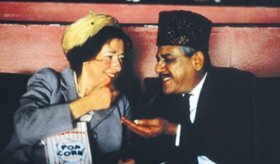|
|
| Tookey's Review |
|
| Pro Reviews |
|
| Mixed Reviews |
|
| Anti Reviews |
|
| Cast |
|
| |
 |
| |
| Released: |
1999 |
| |
|
| Genre: |
DRAMA
COMEDY
|
| |
|
| Origin: |
GB |
| |
|
| Colour: |
C |
| |
|
| Length: |
96 |
|
| |
|
| |
|
|
| |
|
|
Trials and tribulations of an Anglo-Pakistani family in the north of England.
|
Reviewed by Chris Tookey
|
|
East Is East is up there with the very best comedies. It's extremely funny, with more laugh-out-loud moments than you can count, and a climax that made me weep with laughter. It also has depth, with a sensitive approach to such heavyweight topics as racism and domestic violence.
The masterly screenplay and lively direction are by exciting new talents. Its warmth and generosity of spirit deserve to make it a smash-hit around the world. The best British comedy since The Full Monty? No. It's far better.
Om Puri (pictured right), who has impressed before in less than distinguished British films, gives the performance of his life as George Khan, a proud Muslim, Pakistani and Salford chip-shop owner. He has Ella (Linda Bassett, pictured left), a no-nonsense, hard-working Lancashire lass as his wife, plus six sons and a daughter, who respect and fear him, calling him "Genghis" behind his back. Like an Islamic Tevye the Milkman, he is bent on marrying off his oldest offspring through arranged marriages.
When his oldest son (Ian Aspinall) humiliates his father with a bolt from imminent wedlock, George removes his photograph from the wall and declares him dead. "No, he's not," his wife points out placidly. "He's living in Eccles". The rest of the story revolves around Dad's iron determination to marry off his next two sons to two of the ugliest girls in Bradford.
The film is set in 1971, but it could almost be today. The period just offers scope for lovely little nostalgic touches - such as the ubiquitous space hopper - and a wealth of character detail: the cocktail barman who's too smooth for the safety of his own drinks, the youngest boy's constant use of his parka as a comforter…
Linda Bassett gives a blissful performance, which brings together the best qualities of Brenda Blethyn's befuddled mum in Secrets and Lies, and Kathy Burke as the battered wife in Nil By Mouth. It is partly because of her obvious affection for George, despite everything, that he doesn't become a monster, and the whole film doesn't descend into laughter-freezing melodrama. Yet the scene where she is beaten up is as terrible in its way as the equivalent moment in that great drama from New Zealand about domestic violence, Once Were Warriors.
As in The Full Monty, you have the feeling that there is real pain here and real joy. The moment when Ella finally speaks her mind constitutes one of the triumphant moments in cinema. I can imagine people - especially women - cheering her, in cinemas around the world.
The mostly inexperienced actors produce faultless performances, winning big laughs without straining for them, creating a rich tapestry of character with minimal dialogue. This is a huge tribute to director Damien O'Donnell. His work here is better than promising. It's terrific, with a vigour and relaxed invention reminiscent of Alan Parker in The Commitments.
Credit, too, should go to producer Leslee Udwin (who's also a fine actress), for spotting the universality of the film's theme. Everyone will respond to the children's problems here, which exist regardless of race, colour or creed. It's one of the few films that advocates freedom for children without downgrading the responsibilities of adulthood.
But the star here is the script, clearly written from the heart by first-timer Ayub Khan Din, and brilliantly adapted from his own play. Can he write another screenplay this good ? It is a hard act to follow, since it has the robust good humour of Bill Forsyth's Gregory's Girl, the quirky one-liners of The Commitments and the social observation of Mike Leigh's Secrets and Lies. But my guess is that we'll be hearing a lot more from him.
Despite the film's Anglo-Pakistani setting, the film is very British. It's firmly in the tradition of other great tragi-comedies about British patriarchs, such as Harold Brighouse's Hobson's Choice and Bill Naughton's Spring and Port Wine.
It also has that treasurable Ealing-comedy quality of helping to redefine Britishness. It shows a marvellously common-sense approach to race relations, appreciating and embracing the differences between cultures, not pretending that they don't exist.
It understands that racism is not a purely white-against-black phenomenon, but often a product of sincere commitment to a set of values, mingled with fear of the unknown. Like Beautiful People earlier this year, it celebrates tolerance as one of the great British virtues, and one from which all cultures can learn.
There is coarse language and behaviour, but all of it is true to the film's setting, and I don't think many will find East Is East any more offensive than a Donald McGill postcard. I can't find anything in this movie about which I would be seriously critical.
The only failure surrounds its commissioning. Astonishingly, the BBC (which developed the film) couldn't or wouldn't find the money to shoot it, whereupon the project passed to Channel 4. Who passed on this, yet gave the go-ahead to such horrors as Bring Me the Head of Mavis Davis? I trust the people who made that decision will regret it for the rest of their lives.
|
|
|
|
|
